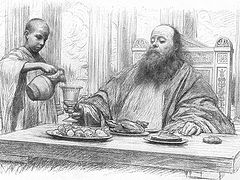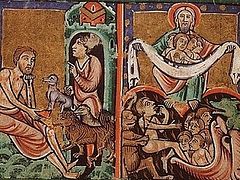There was a certain rich man, which was clothed in purple and fine linen, and fared sumptuously every day: And there was a certain beggar named Lazarus, which was laid at his gate, full of sores, And desiring to be fed with the crumbs which fell from the rich man's table: moreover the dogs came and licked his sores. And it came to pass, that the beggar died, and was carried by the angels into Abraham's bosom: the rich man also died, and was buried; And in hell he lift up his eyes, being in torments, and seeth Abraham afar off, and Lazarus in his bosom. And he cried and said, Father Abraham, have mercy on me, and send Lazarus, that he may dip the tip of his finger in water, and cool my tongue; for I am tormented in this flame. But Abraham said, Son, remember that thou in thy lifetime receivedst thy good things, and likewise Lazarus evil things: but now he is comforted, and thou art tormented. And beside all this, between us and you there is a great gulf fixed: so that they which would pass from hence to you cannot; neither can they pass to us, that would come from thence. Then he said, I pray thee therefore, father, that thou wouldest send him to my father's house: For I have five brethren; that he may testify unto them, lest they also come into this place of torment. Abraham saith unto him, They have Moses and the prophets; let them hear them. And he said, Nay, father Abraham: but if one went unto them from the dead, they will repent. And he said unto him, If they hear not Moses and the prophets, neither will they be persuaded, though one rose from the dead (Lk. 16:19-31).
In vain do you now ask the beggar Lazarus to visit you, to bring at least a drop of water on the tip of his finger to cool your tongue. There was a time when this poor man was before your eyes every day, lying at the gates of your house, and you paid him no mind. There was a time when he suffered, and you were satiated with pleasures—now it’s time for you to suffer, and for him to be comforted. Lazarus bore the heavy burden of illnesses and sorrows all his life. Now he’s in blessed joy and you’re in hell: God has no unrighteousness—every iniquity will receive its reward. God hasn’t slighted you, and He won’t slight Lazarus. Both the rich and the poor are equal before Him. He rewards everyone according to His deeds (cf. Mt. 16:27, Rom. 2:6).
Lazarus had his sins, just as you had many. But there was also much good about Lazarus, which he forgot about in lamenting for the sins that his sorrows, poverty, and illnesses reminded him of. And you had good deeds of which you boasted, forgetting about the multitude of your iniquities. You didn’t openly renounce God; you had regard for men, and weren’t openly iniquitous: In open, you loved those who loved you; you tried to show your integrity, you didn’t openly steal or behave as a robber; a hundred mouths have praised you for your hospitality, for your skill in living.
And you’ve received a reward for this: You led your whole life in pleasures—this is your reward for those crumbs of goodness that you did. Remember that you already received your good in your life (cf. Lk. 16:25)—God has paid you your due. Now you’re paying what’s due to righteousness of God, which suffers no iniquity. You rendered no honor to another—and for this you’re deprived of the glory of God, to the fulfillment of what was said: Let the ungodly be taken away, that he see not the glory of the LORD (Is. 26:10). You dressed yourself in porphyry and fine linen but didn’t want to cover the festering wounds of your brother lying at your gates; you spent your life in feasts and amusements and gave no care to give at least the crumbs from your table to feed the hungry Lazarus, who awaited these crumbs together with the dogs. Now you’re in fire, naked, and Lazarus is in blessedness and light instead of cold and rags.
So, remember that you already received your good in your life, and Lazarus—evil (cf. Lk. 16:25). For the sins of youth, for the sins of ignorance, for his infirmities, he is punished with poverty and disease. He was poor but didn’t steal; he was sick but didn’t grumble; he suffered grievously but patiently endured his sufferings; he looked at life as a gift of God and didn’t throw this gift into the dirt, as do the madmen who commit suicide. He was punished enough for his minor sins while on earth. Now, he will receive blessings for his great forbearance. The judgment of God is righteous! This is the meaning of the answer Abraham gives from the Heavenly mansions to the rich man who was suffering in the flames of hell. Let us learn from this parable, brethren, and let us firmly remember the truth that virtue won’t go unrewarded nor vice unpunished; that both the righteous and sinners will receive righteous reward in due time.
Why hath the ungodly one provoked God? For he hath said in his heart: He will not make enquiry… God is not before him. Profane are his ways in every season (Ps. 9:33, 24-25). There have always been, there are, and there probably will be until the end of the world those wicked who say: “There is no God! God doesn’t see! God doesn’t seek!”—words that are truly characteristic of madness and impiety. No one in their right mind could say this. Heretofore, no such people could have been found on earth who didn’t have some kind of worship of God; if all peoples recognize the existence of God, that means the thought of God is innate to all mankind,faith in God is a sign of sanity, and the denial of the existence of God is a deviation from common sense.
The wicked, who deny the existence of God, often do so only because the existence of God is undesirable for them—and undesirable because their reason and conscience tell them that if there’s a God, then He certainly must be just, and if He’s just, then He’ll certainly repay them for their wickedness. An unjust God isn’t God. It’s innate for man to think this way—both the educated and barbarians think this way. If there’s a God, then He’s holy, and can’t endure iniquity. If God is holy and righteous, then the wicked must suffer the due reward for their iniquity, and the righteous—for their righteousness.
But here on earth, we don’t see everyone being rewarded according to his deeds. Here, sometimes a thief steals, a robber robs, a sensualist lives in depravity, a killer isn’t always revealed—and they don’t all always receive the retribution of justice: The wicked drown in luxury and pleasures; the robber, the embezzler increases his possessions and is blessed on earth, while the honorable man suffers want and contempt; wickedness is praised, piety is mocked. The poor man struggles with all his might to earn some food for himself and his family, and nothing works out: It’s as though the hand of God is weighing upon him—while another, perhaps his neighbor, has success in everything, as if he were born only for happiness.
Where is righteousness on earth? Indeed, it can’t always be seen here. But that doesn’t mean it doesn’t and won’t exist: It only testifies to the truth, revealed and attested to by God, that human life doesn’t end with earthly existence; that after this temporary existence begins another, eternal existence. And for this eternity, a full recompense is reserved for everyone according to his deeds. Otherwise, God’s righteousness would appear to be less righteous than human righteousness. And as this can’t be conceded, it means wickedness will certainly be punished—if it’s not punished here, it will be punished when God comes to judge the world in righteousness (cf. Ps. 9:8).
So, let those who gather treasures and the profligates be afraid, that they might not be condemned like the rich man of the Gospel; that their laughter might not turn into tears; that they might not inherit, instead of bright, clean palaces, the dungeons of hell; that timbrel and dance might not be replaced by weeping, wailing, and gnashing of teeth from the gnawing of the infernal worm (cf. Mk. 9:44); that instead of luxurious garments, they might not be dressed in shame; instead of actors’ costumes, they might not be unwilling spectators of vile, ugly demonic faces.
And let all of us, brethren, examine whether we resemble this rich man of the Gospel—if not by the richness of palaces and the abundance of feasts, if not by the luxuriousness of clothes, then by our extravagance in pleasure, miserliness in charity, hardness of heart towards the suffering, and addiction to pleasure. Let us firmly believe that our life doesn’t end with death, that beyond the grave begins another life: for some—ill-fated, for others—blessed.
And you who are hungry and thirsty here, you who are innocently suffering, who are sick, you who are forgotten and despised by everyone, take comfort in the hope that God’s word shall not pass away: All that it proclaims shall be fulfilled; your sufferings, sorrows, poverty, and illnesses shall not be in vain; therefore,don’t grumble against God, against your fate. Bear the burden of your sorrows, sufferings, and sicknesses without complaint, as the fate of God. Believe that Paradise with infinite blessedness is prepared for you for this. Don’t be jealous of those who work evil, don’t envy the iniquitous: They shall soon wither like grass (cf. Ps. 36:1-2), and like dry brushwood, will be thrown into a fiery furnace—where their worm dieth not, and the fire is not quenched (Mk. 9:44). Lazarus will be in joy, and the rich man in hell: Holy and righteous is the Judge!




